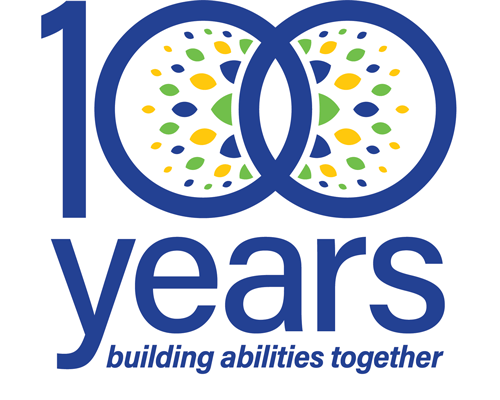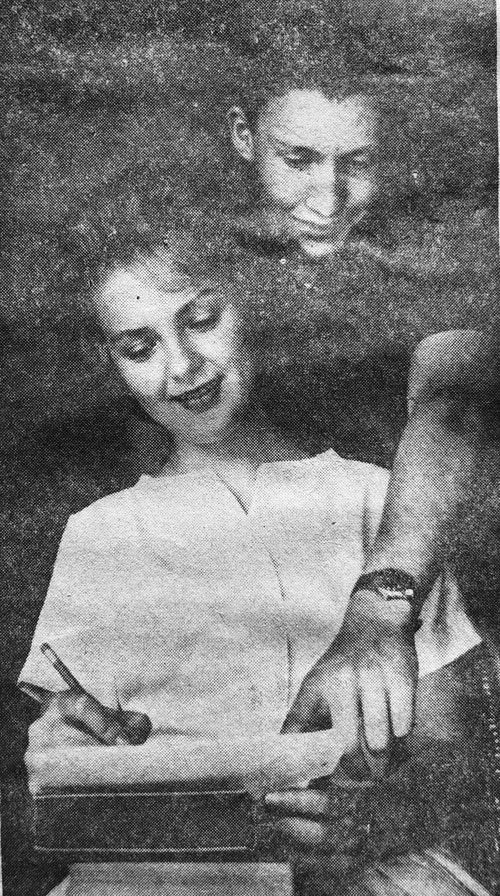Teens Volunteer (1962)
Disclaimer: The following was transcribed from an article in the Capper Foundation Archives published by The Topeka Capital-Journal. The choice of words used at the time this was written may not reflect current Capper Foundation inclusive language and views.
Teenagers Get Professional Training to Learn to Sit With Handicapped (1962)
by Helen Pannone
Although thoughts of school are behind and summer has begun, a club fostering a “child sitters” program that began during the school year is now bearing fruit.
The Downtown Rotary Club asked parents of handicapped children if they would be interested in especially trained sitters.
 “Six families with children who have orthopedic problems, and a dozen families of retarded children, said they would appreciate babysitters what had training and understanding of their children,” said Mrs. Ellen Roose, supervisor of rehabilitation services at the Capper Foundation for Crippled Children.
“Six families with children who have orthopedic problems, and a dozen families of retarded children, said they would appreciate babysitters what had training and understanding of their children,” said Mrs. Ellen Roose, supervisor of rehabilitation services at the Capper Foundation for Crippled Children.
The Rotary Club then presented the program to the Future Medical Careers Club at Topeka West High School. Ten of the club members volunteered for the program.
“The teen boys and girls were trained at the Capper Foundation and Kansas Neurological Institute. They were taught by lectures, observance, and practical demonstration,” said Mrs. Roose. “At the end of the course, parents in need of their services were given their names and phone numbers.
Nathan Jordan, 16, son of Mr. and Mrs. Ralph Young, said, “When I attended the training sessions at the Capper Foundation on Saturday mornings, I noticed first that Mrs. Roose didn’t handle the children as though they were crippled. I learned they did not need to be handled like infants.
“We as a group learned how to help kids get dressed. We helped feed them, and played with them, kids from second graders on up. I spent most of my time with one boy in particular – Jim. Jim is a Life Scout. He is brilliant although crippled. We worked on scouting together. We went through all the requirements for his God and Country award.
“He couldn’t walk to fulfill his hiking requirements, so he rolled his wheelchair 20 miles. Look at the arm muscles that would take! He couldn’t swim either, so he had to get five merit badges to make up for that. Boy he really impressed me!
“Mike Huddleston, another boy taking this course helped build a model car with a boy at the foundation. The girls did things the girl patients like – like combing their hair, things like that.”
Nathan had joined the Medical Careers Club at school because of his interest in medicine. He said, “The first meeting I attended, a doctor spoke on how to make splints. I joined the club then.” He hopes to become a doctor.
Becky Hall, 17, daughter of Mr. and Mrs. Stephen Hall, did volunteer work at the Kansas Neurological Institute before taking the course. She also had learned about the care of such children through a special Sunday School class at the First Congregational Church.
“Our church is one of two, I believe, that has a Sunday School class just for retarded children – children from K.N.I., from foster homes, or of parents who bring them to class. The class is held during the regular church service. It has a teacher, an aide, and me. There are 6 to 12 children every Sunday.”
Margie Bryan, 15, daughter of Mr. and Mrs. David Bryan, has become so interested in the handicapped child, she’s thinking about learning to be an occupational or physical therapist.
“At first I thought I wouldn’t be able to understand them, that somehow they wouldn’t be normal but I found that they’re just like other children.”
Dinah Rice, 17, daughter of Mr. and Mrs. Orville Rice, said that she would like to be a teacher for handicapped children.
“The first thing I learned in the course is that handicapped children aren’t different – and even have many characteristic I wish I had. For instance, I particularly admire how patient handicapped children are. They don’t complain – and it seems to me they have plenty to complain about.
The experience has been wonderful – good for all of us. We’ve gotten to know the kids. They rely on us now and we feel useful. I sure want to be called to sit with them and other kids like them, now that I’ve been trained to put them to bed, feed, dress them, and put on or take off their braces. What would I do in an emergency? I’d call the doctor, I guess.”
Charlotte Langley, 18, daughter of Mr. and Mrs. Robert Mardis, has just graduated from Topeka West High School. She had joined the Medical Careers Club at school because of her interest in nursing. But since her training with handicapped children, she isn’t certain if she wants to study nursing or go into social work.
“While I’m deciding, I’m going to go to Washburn,” she said.

